"The Poets in Low Life": Working-Class Poets
The Romantic period of English literary history is coextensive with what historian E. P. Thompson influentially referred to as the period of "The Making of the English Working Class." It was a time that witnessed not only the emergence of new forms of government, industrial production, and literature, but also the emergence of class consciousness and a true working-class movement in England. The nineteenth century also witnessed the beginnings of a canon of working-class, or laboring-class, poetry. Robert Southey's essay "On the Lives and Works of Our Uneducated Poets," an introductory essay to Attempts in Verse, by John Jones, an Old Servant, is a formative document in this process. Southey referred to them as "the poets in low life," showing that notions of class were still inchoate, but growing in significance. Southey, who was the Poet Laureate of England from 1813-1843, actively supported working class poets and helped to bring their work into print. Politically radical in his youth, Southey had by this time turned quite conservative, and his interest in working-class poets was ideological in that he promoted the work of those who expressed contentment with their 'low' position in life.
In the Victorian period, galvanized by the Chartist movement from the 1830s to the 1850s, working-class poets increasingly identified their literary work with working-class politics. As scholar Peter Scheckner points out, "Chartist poems were read every week by hundreds of thousands of active Chartist workers and supporters throughout England, Scotland, Wales, and Ireland; the ideas and commitment behind these works were translated month by month into political action." The Chartist movement is represented in the exhibit by the work of Gerald Massey and Ebenezer Jones, both of whom also worked for the Chartist press. Of the Victorians, Dante Gabriel Rossetti and others in his circle, the Pre-Raphaelite Brotherhood, take the role that Southey played earlier in the nineteenth century, preserving and promoting the poetry of working-class authors threatened with extinction.
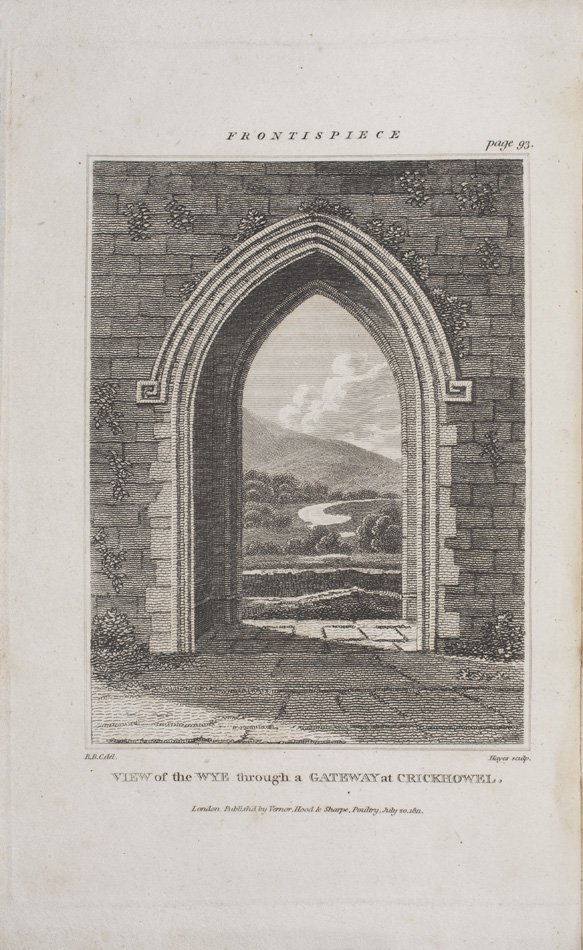
Robert Bloomfield (1766-1823)
London: Printed for the Author; Vernor, Hood, and Sharpe; and Longman, Hurst, Rees, Orme, and Brown, 1811
Gift of Deborah Wachs Barnes, Sharon Wachs Hirsch, Judith Pieprz, and Joel Wachs, AB’92
Bloomfield was the son of a tailor and schoolmistress; his father died when he was only a year old, leaving the family impoverished. In 1781, he went to London and began working as shoemaker with his brother George. His first book of poetry, The Farmer's Boy, which was published in 1800 through the advocacy of Capel Lofft, radical editor and writer, was a great success, selling twenty-six thousand copies in less than three years. The Banks of Wye began as a journal that Bloomfield kept while on a tour of the Wye river (famous from Wordsworth's "Tintern Abbey") with admirers in 1807.
Wachs No. 721
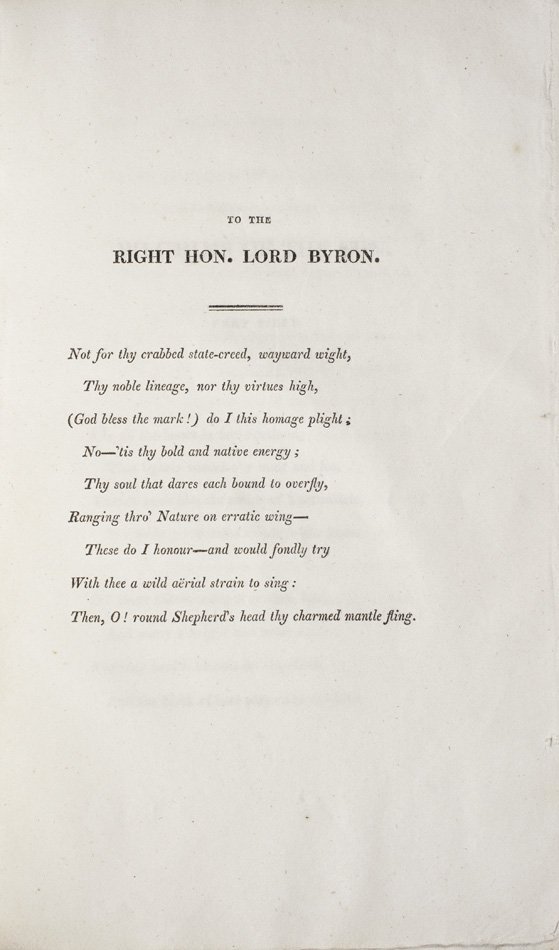
James Hogg (1770-1835)
Edinburgh: Printed for William Blackwood, 1815
Gift of Deborah Wachs Barnes, Sharon Wachs Hirsch, Judith Pieprz, and Joel Wachs, AB’92
Hogg was the son of a shepherd and farmer, born in Selkirkshire, Scotland. Hogg was only six years old when his parents lost their farm and he had to begin work on various local farms. He achieved success with The Queen's Wake, published in 1813, in which he was introduced as "a common shepherd, bred among the mountains of Ettrick Forest." The Pilgrims of the Sun followed next, and was dedicated to Lord Byron. Hogg had a lengthy involvement with Blackwood's Edinburgh Magazine, one of the most successful periodicals of the time, through which he was popularized as "the Ettrick Shepherd." He also went on to become a successful writer of prose fiction. When Hogg died, William Wordsworth composed an "Extempore Effusion Upon the Death of James Hogg," which concludes: "With sharper grief is Yarrow smitten, / And Ettrick mourns with her their Poet dead."
Wachs No. 444
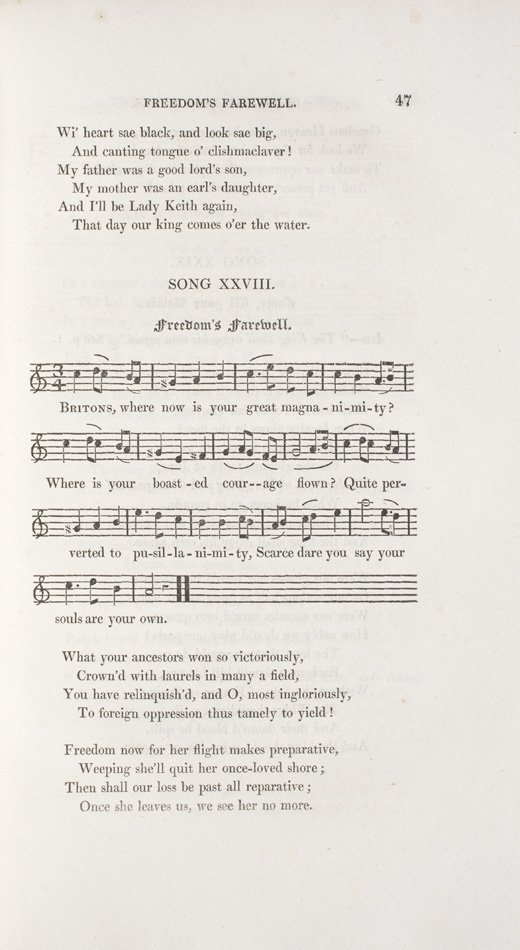
James Hogg (1770-1835)
Edinburgh: Printed for William Blackwood; and T. Cadell and W. Davies, 1819
Gift of Deborah Wachs Barnes, Sharon Wachs Hirsch, Judith Pieprz, and Joel Wachs, AB’92
Hogg met and befriended Sir Walter Scott in 1802, and helped him in collecting ballads for the third edition of his Minstrelsy of the Scottish Border, which was published in 1803. Encouraged by the Highland Society of London, Hogg began his own collection of Scottish songs—those of the Jacobite risings of the eighteenth century. Hogg prints the melody as well as the lyrics, and offers extensive notes on the songs. Douglas S. Mack writes that like "Burns, Hogg questioned and subverted aspects of the Scottish Enlightenment, and created a space in which the allegedly 'marginal' and 'primitive' culture of the old Scottish peasantry could speak with eloquence and power."
Wachs No. 793
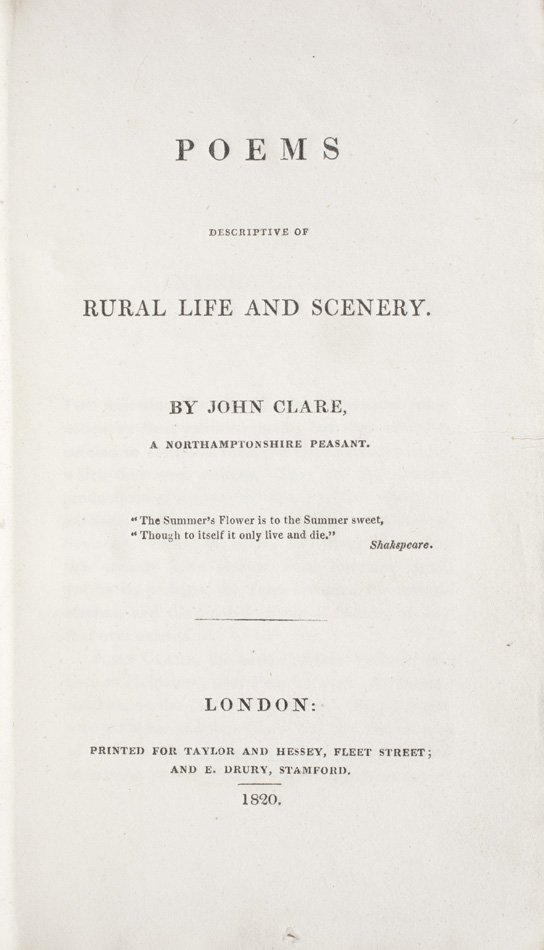
John Clare (1793-1864)
London: Printed for Taylor and Hessey; and E. Drury, 1820
Gift of Deborah Wachs Barnes, Sharon Wachs Hirsch, Judith Pieprz, and Joel Wachs, AB’92
The introduction refers to the poems as "the genuine productions of a young Peasant, a day-labourer in husbandry, who has had no advantages of education beyond others of his class." The volume was an immediate success, selling out the first edition in two months. Clare was never able to reproduce this early success with his later works, and he spent the end of his life in the Northampton General Lunatic Asylum, where he died of apoplexy. He was largely forgotten for the end of the nineteenth century and much of the twentieth, but his reputation has been rehabilitated in recent decades, and he is now considered by many one of the great nature poets of the nineteenth century.
Wachs No. 27
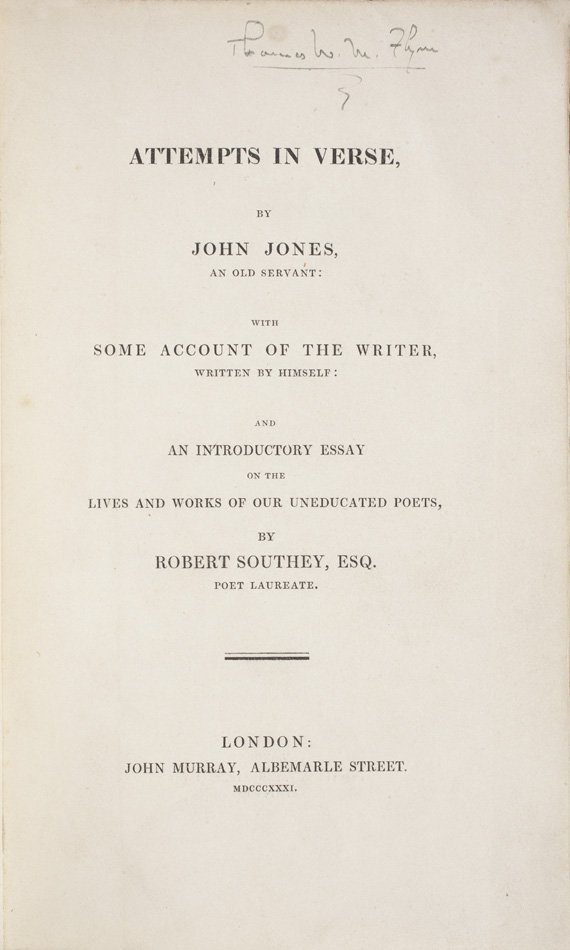
John Jones (b. 1774)
London: John Murray, 1831
Gift of Deborah Wachs Barnes, Sharon Wachs Hirsch, Judith Pieprz, and Joel Wachs, AB’92
Southey's essay occupies about half the book, and is of historical significance as the first significant critical attempt at constructing a canon of working-class poets. John Jones worked from the age of seventeen as a domestic servant. In the summer of 1827 he sent a letter to Robert Southey introducing himself as "a poor, humble, uneducated domestic" and including a sample of his verse. The correspondence eventually resulted in the publication of this book, which was sold by subscription. The list of subscribers includes John Taylor Coleridge, nephew of Samuel Taylor Coleridge, and William Wordsworth.
Wachs No. 553
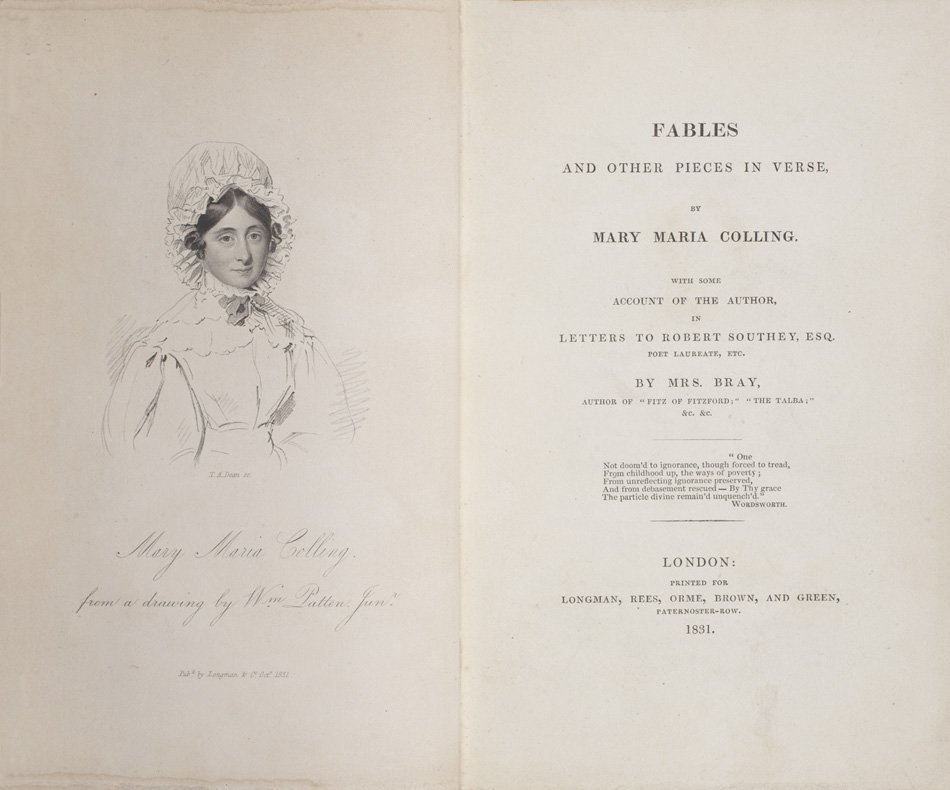
Mary Maria Colling (1804-1853)
London: Printed for Longman, Rees, Orme, Brown, and Green, 1831
Gift of Deborah Wachs Barnes, Sharon Wachs Hirsch, Judith Pieprz, and Joel Wachs, AB’92
Mary Maria Colling was born in Tavistock, Devon, in 1804. She was the daughter of a husbandman. This book, her only publication, was seen into print by the well-known novelist Anna Eliza Bray; almost half the book is devoted to three long letters from Mrs. Bray to Robert Southey. As with John Jones, Southey was instrumental in the publication and promotion of Colling. Southey reviewed the book in the Quarterly Review, writing that Colling was "happy in her humble station." He also recognized the promotional value of Colling's image, on the frontispiece, writing to William Lisle Bowles that her "sweet countenance, if you look at her portrait, will say more in her favor than any words of mine could do." The ten-page list of subscribers includes both Southey and Wordsworth.
Wachs No.448
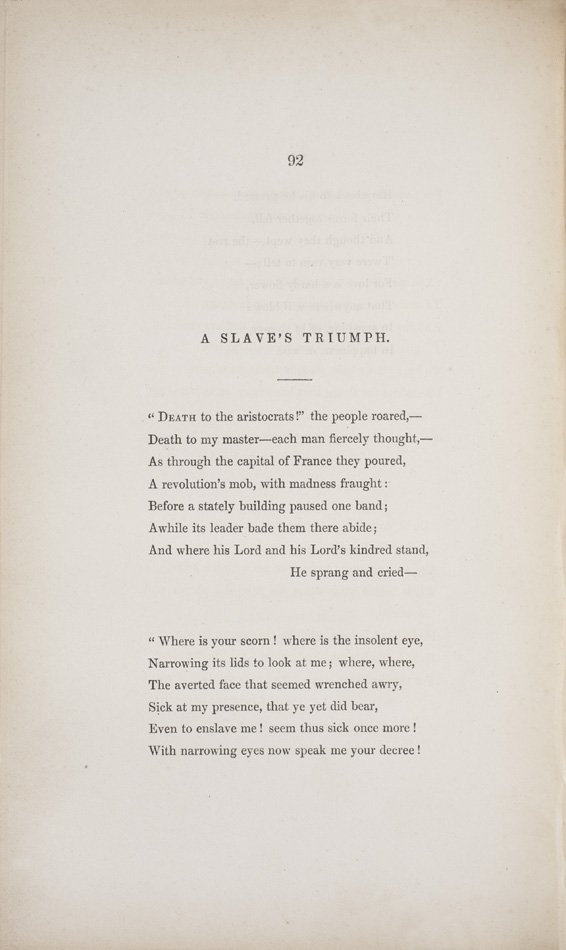
Ebenezer Jones (1820-1860)
London: Charles Fox, 1843
Gift of Deborah Wachs Barnes, Sharon Wachs Hirsch, Judith Pieprz, and Joel Wachs, AB’92
Jones was born in London, the son of a Welshman. When his father died in 1837 the family became impoverished and Jones went to work as a clerk, working twelve hours a day. Studies of Sensation and Event was Jones's first book, published when he was twenty-three years old. After the book's harsh reception, Jones gave up poetry and worked as an accountant, assisted W. J. Linton—influential in the Chartist movement and himself a poet—in his political journals, and worked for radical publishers. After his early death in 1860, Jones was largely forgotten until Dante Gabriel Rossetti wrote about him in Notes and Queries in 1870, claiming that Jones was "nearly the most striking instance of neglected genius in our modern school of poetry." This resulted in a brief renewal of interest and a reprint of the present volume in 1879.
Wachs No. 536
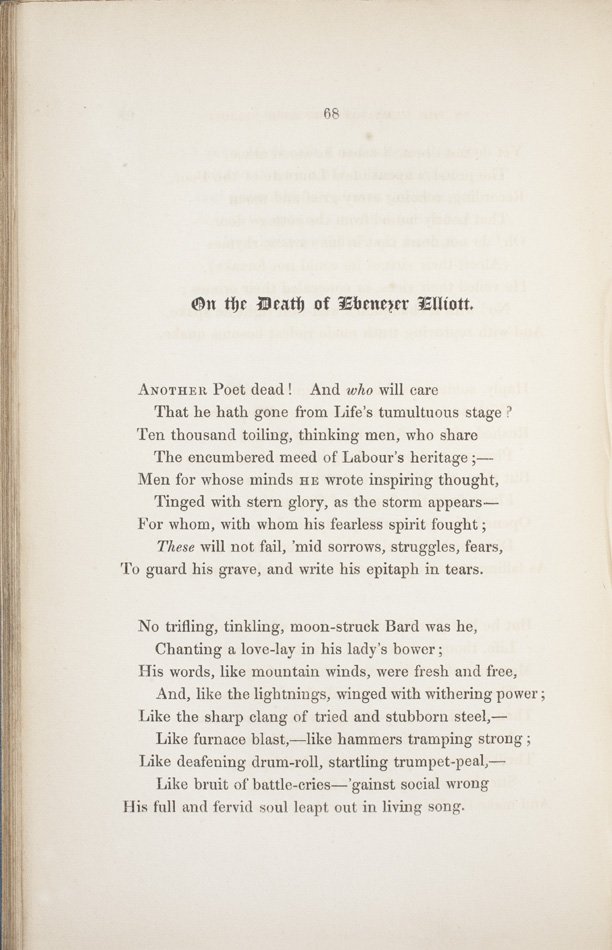
John Critchley Prince (1808-1866)
Ashton-under-Lyne: Printed for the Author, and Sold by Him, 1850
Gift of Deborah Wachs Barnes, Sharon Wachs Hirsch, Judith Pieprz, and Joel Wachs, AB’92
Prince was the son of a reed maker and began working fourteen to sixteen hour days with his father from the age of nine. As a young man, and despite having a family to support, Prince established a club of working-class poets, calling themselves the "Literary Twelve," in Hyde in 1836. The Poetic Rosary was Prince's third book of poems, dedicated to Charles Dickens for his "humanizing writings." Prince's sympathies with working-class politics are demonstrated in the poem "On the Death of Ebenezer Elliott." Elliot was well-known as the "Corn Law Rhymer" for his verses written in opposition to the Corn Laws and was a vocal opponent of economic oppression and poverty: as Prince puts it in the poem, "'gainst social wrong / His full and fervid soul leapt out in living song."
Wachs No. 455
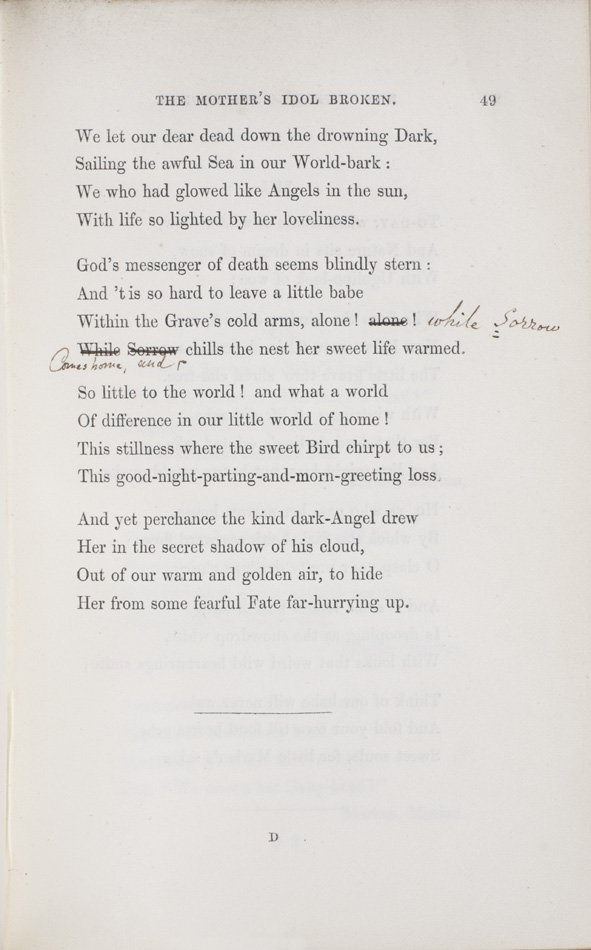
Gerald Massey (1828-1907)
London: David Bogue, 1856
Gift of Deborah Wachs Barnes, Sharon Wachs Hirsch, Judith Pieprz, and Joel Wachs, AB’92
Massey was "born in a hut at Gamble wharf on the canal near Tring, Hertfordshire," the son of a boatman. At the age of eight, Massey went to work in the silk mill at Tring, working twelve hour days for roughly a shilling a week. In 1848 he joined the Chartist movement, and also published his first book, Poems and Chansons. The Ballad of Babe Christabel and other Poems (1854) established Massey's reputation both as a poet and an eloquent champion of the working-class. Walt Whitman wrote of his poems in 1855, "They seem to me zealous, candid, warlike,—intended...to get up a strong feeling against the British aristocracy both in their social and governmental political capacity." George Eliot partially based her novel Felix Holt, the Radical (1866) on Massey's life and work.
Wachs No. 582
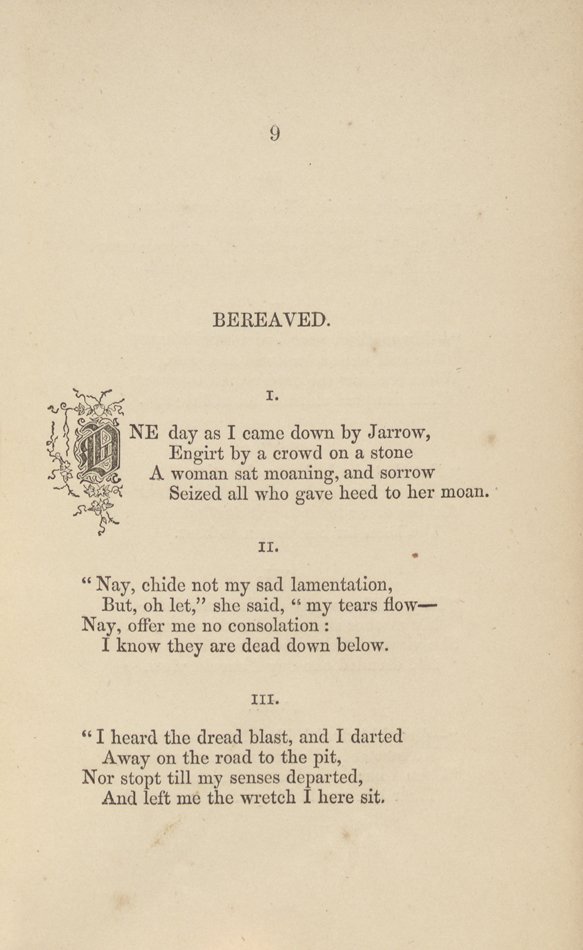
Joseph Skipsey (1832-1903)
Blyth: Printed by William Alder, 1871
Gift of Deborah Wachs Barnes, Sharon Wachs Hirsch, Judith Pieprz, and Joel Wachs, AB’92
Skipsey was the youngest of eight children of a Northumberland coal-miner. He went to work in the coal pits at the age of seven, working twelve- to fourteen-hour days. He achieved literary notice in 1862 with his poem "The Hartley Calamity" about an accident that buried over two-hundred coal workers alive. An early notice of Skipsey's verse was published in the Athenæum by the recipient of this copy, Joseph Knight. Dante Gabriel Rossetti wrote that Skipsey's "real-life pieces are more sustained and decided than almost anything of the same class that I know—I mean in poetry coming really from a poet of the people..." Oscar Wilde likened Skipsey to Blake. In 1889 Skipsey and his wife were named custodians of Shakespeare's birthplace at Stratford, but he soon tired of the drudgery and dishonesty of attending to tourists, and resigned. The incident was the subject of Henry James's short story "The Birthplace."
Wachs No. 707
